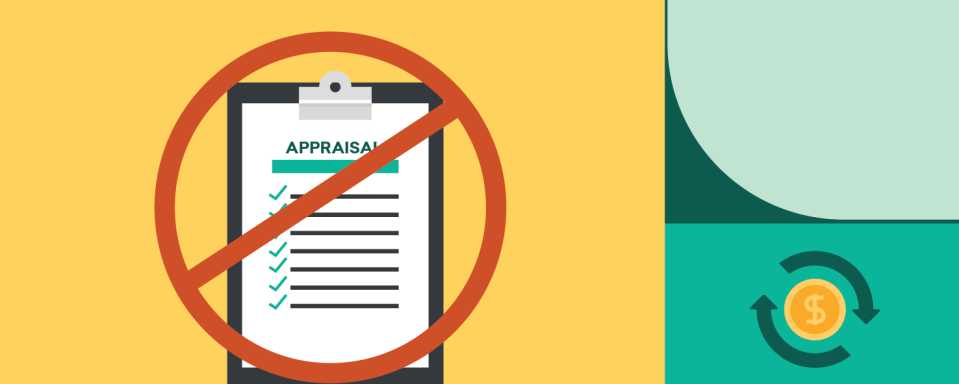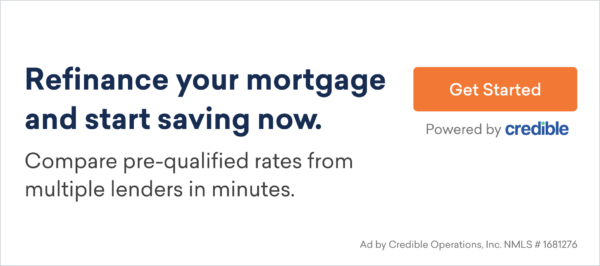No Appraisal Refinance: Is It Worth It?

Credible Operations, Inc. NMLS# 1681276, “Credible.” Not available in all states. www.nmlsconsumeraccess.org.
This article first appeared on the Credible blog.
Lenders generally require an appraisal during the refinancing process, but it’s not necessary in every case. Depending on your circumstances and loan type, you might be able to refinance without one.
Before you commit to any mortgage refinance loan, it makes sense to lenders. Credible makes it easy to compare lenders and choose a rate that works for you.
Why most refinances require an appraisal
An appraisal is a professional assessment of a home’s value. Lenders use these to ensure you aren’t borrowing more than what your property is worth.
When a home appraisal is required — both in a refinance or a purchase — the lender will order the service, but you’ll pay for it. These generally run between $300 and $400 and are paid for at closing.
If you’re planning to refinance, make sure you shop around for your lender — it could save you on both closing costs and your interest rate. Credible can help with the rate-shopping process. You can compare actual prequalified rates from our partner lenders, and it only takes a few minutes.
What appraisers look for when you’re refinancing
Appraisers are looking to evaluate your home’s worth for the lender. From the lender’s standpoint, your home is the collateral — and they’ll need to sell it if you fail to repay your loan. If the home isn’t worth enough, they won’t recoup their losses.
Appraisers will consider a number of internal and external factors, including:
The physical condition of the home
Any upgrades you’ve made
Square footage
Similar properties recently sold in the area
Refinance home appraisals aren’t much different than those on home purchases, except you’re able to attend them (you live in the home). This can be helpful if you’ve made upgrades to the property you think should be considered by the appraiser.
Once the appraisal is complete, you’ll get a report stating the appraiser’s findings, as well as the value they put on your home.
If the appraisal comes in lower than what you’re looking to borrow, you can:
Cancel your refinance
Ask for a new appraisal
Make up the difference between your loan amount and the appraised value in cash
Whether you’re considering refinancing to get a lower interest rate or to tap equity with a cash-out refinance, Credible makes it easy to compare mortgage refinance rates from multiple lenders.
Who can get a no-appraisal refinance
There are some scenarios in which you might not need an appraisal, both with conventional loans and government-backed ones. These instances aren’t the norm, though they have grown more common since the COVID-19 pandemic began.
For conventional loans
If you’re refinancing a conventional loan, you might qualify for an appraisal waiver. If you do, your lender will simply use your existing data, including any past appraisals, to estimate your home’s value.
When it comes to qualifying for an appraisal waiver, it will depend on who owns your loan. Fannie Mae and Freddie Mac each have different requirements, both of which are based on loan-to-value ratio — or how much you’re borrowing versus how much your home is worth.

Freddie Mac-backed loans tend to see appraisal waivers granted more often. According to the American Enterprise Institute, 26.5% of cash-out refinances and 60.7% of rate and term (no cash-out) refinances had the appraisal waived in May 2020. With Fannie Mae loans, it was 22.6% and 56.8%, respectively.
For government-backed loans
If you have a government-insured mortgage, you also have options for a no-appraisal refinance.
Here’s what currently available:
FHA Streamline Refinance: FHA Streamline Refinances are designed for FHA borrowers refinancing into new FHA loans. These require no appraisal and, in some cases, no credit check either.
VA Interest Rate Reduction Refinance Loan (IRRRL): The Department of Veterans Affairs offers the Interest Rate Reduction Refinance Loan designed for borrowers looking to refinance and lower their interest rates. You must already have a VA loan to qualify.
USDA Streamlined Assist Refinance: Streamlined Assist Refinances are for USDA borrowers. They require no credit check and no appraisal as long as you’ve made your payments for the last 12 months. Your debt-to-income ratio is not factored in, either.
Should you get a no-appraisal refinance?
Skipping the appraisal can save you both money and time, but if your home has increased in value, it might be the wrong move.
Pros of a no-appraisal refinance
There are significant benefits to refinancing without an appraisal. These include:
Reduced costs: You’ll save around $300 to $400 on closing day by skipping the appraisal.
Faster processing: Appraisals extend the time it takes to close on your loan. In fact, according to the National Association of Realtors, appraisal issues were the culprit in 18% of delayed closings in January 2020.
Cons of a no-appraisal refinance
Of course, no-appraisal refinances aren’t without drawbacks. Here’s what to keep in mind before skipping yours:
You could be eligible for more cash out: If your home increased in value, you might be able to take out additional cash when you do a cash-out refinance. An appraisal would be needed to confirm this, though.
You could get a lower rate or avoid mortgage insurance: A higher home value also means more equity, which could qualify you for a lower interest rate or even help you avoid costly mortgage insurance.
Whether your mortgage refinance requires an appraisal or not, make sure to shop around for your loan. Rates and closing costs vary by company, so shopping around can help save you significantly — both upfront and over the length of your loan.
Credible can help you easily find the latest mortgage refinance rates and compare your prequalified rates in just a few minutes.
About the author: Aly J. Yale is a personal finance journalist with work featured in Forbes, Fox Business, The Motley Fool, Bankrate, The Balance, and more.

 money
money 

